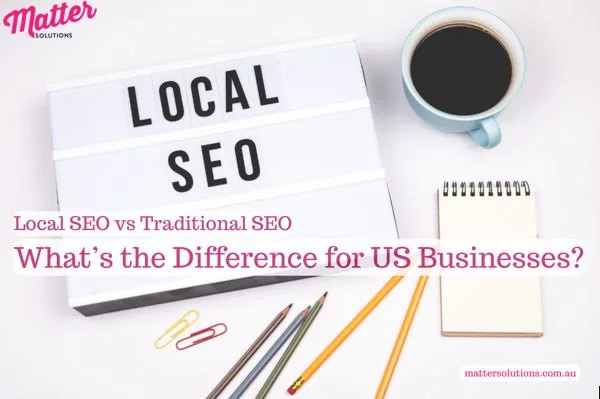Local SEO vs Traditional SEO: What’s the Difference for US Businesses?
Most US business owners think local SEO and global SEO do the same job. They work completely differently, though. Local SEO targets customers in your specific area who are ready to visit or call today. On the other hand, global SEO reaches anyone, anywhere who might want what you offer.
The tricky part is figuring out which one works for your situation. Some companies chase global SEO when their customers live within 20 miles, while others stick to local SEO when they could reach profitable markets nationwide. Without the right strategy, you’re either missing opportunities or wasting resources.
That’s exactly what this article addresses. You’ll see when each approach works for US businesses, get real examples, and understand the decision framework. We’ll also explain how www.mattersolutions.com uses data to guide smarter SEO choices. Ready to figure out which path works better for your business? Here’s everything you need to know.
Local SEO vs Traditional SEO: The Main Differences You Need to Know
Many business owners get confused when they hear about different SEO approaches. The truth is, local SEO and global SEO work in completely different ways, even though both aim to get you found online. Let me break down what makes each one unique.
What Does Local SEO Do for Your Business?
Local SEO focuses on making your business visible when people search for services “near me” or in your city. Your Google Business Profile becomes the centre of attention, along with local keywords and location-specific content. When someone in your area needs what you offer, local SEO puts you right in front of them.
How Global SEO Works Differently
Global SEO strategies aim to reach anyone searching for your products or services, regardless of location. When doing worldwide marketing, you need to build authority and expertise so search engines trust you enough to rank you for competitive global searches. Local SEO mainly focuses on local keywords and local business directory mentions, but global SEO is a totally different game. You need a great website, a good keyword strategy, and powerful links from reputable websites to even have a chance at ranking.
How to Choose Between Local and Global SEO
Now for the million dollar question: How do you choose between local and global search engine optimisation?
Let me show you.
Local SEO works brilliantly when you need foot traffic or serve a specific geographic area. Global SEO fits businesses that sell online or offer digital services to multiple regions. Simple as that.
Many successful companies combine both methods. We’ve seen this work perfectly with a New York-based plumbing company we helped last year. They started with only local SEO for emergency repairs. Then they launched their online training courses, and combining both approaches doubled their revenue within eight months.
So, what made this successful for that plumbing company? Their Google Business Profile was spot-on from day one, which gave them the local foundation they needed before expanding globally.
Google Business Profile: The Foundation Every Local Business Needs
Why is your Google Business Profile the foundation of local SEO? Simple, it’s the first thing people see when they search for your business locally. Without proper setup, you’re invisible in local search results and Google Maps. It’s basically your digital shopfront working around the clock.
However, getting this right means completing every section thoroughly. That means your business information must be accurate, and your phone number should match what’s on your website. Also, keep your business hours current so customers know when you’re open.
In our experience working with dozens of companies on their local SEO marketing, businesses that optimise their profile properly see a 30% increase in local search visibility within the first month. The ones seeing immediate results always start with this step. Once you’ve got this foundation solid, you can build everything else on top of it.
That’s exactly why getting your keywords right becomes so much easier when your profile is already working for you.
Finding Local Keywords That Connect You with Nearby Customers
Since you’ve got your Google Business Profile sorted, it’s time to find the local keywords that bring nearby customers to your door. Local keywords work differently from regular ones because they include location-specific terms that show local intent.
Here’s what works best for connecting with your local audience:
- “Near me” searches: People type “plumber near me” or “dentist near me” constantly. Why do these location-specific keywords work so well? It’s because someone searching this way needs help right now and wants a business they can reach quickly.
- City and suburb combinations: We’ve seen businesses triple their local calls by targeting “Orlando electrician” or “New Jersey café.” The reason is simple. You’re speaking directly to people in your service area instead of competing with businesses they’ll never visit.
- Service plus location phrases: Here’s something interesting about “wedding photographer New Mexico” versus generic terms. The local version attracts fewer searches, but it brings higher-quality leads who can book your services immediately. So, focus on quality over quantity when building your local keyword list.
- Local landmark targeting: Ever notice how people give directions using familiar places? That’s exactly why “accountant near Westfield” gets searched more than street addresses. Your keyword research should include these natural reference points that locals use every day.
The businesses winning with local search understand something important. Nearby customers using these terms are already thinking about making a purchase, which makes them much easier to convert.
How Google Maps Affects Your Local Search Success
Most people don’t know how much power Google Maps has over local businesses. When customers search for services in your area, they see map results first. Website listings come second. Those top three spots in the map pack get most of the clicks and phone calls.
Getting into that map pack depends on your business information being perfect. One wrong detail pushes you down. Maybe it’s an old phone number or a wrong address. Meanwhile, your competitors with accurate profiles get the visibility and customers.
Through our hands-on experience with local businesses, we’ve seen this pattern many times. Customers search on mobile and check the map for nearby options. Then they contact businesses that look trustworthy. The whole process takes under five minutes from search to phone call.
Pro Tip: Businesses winning this game know that Google Maps visibility means more foot traffic and revenue growth.
Combining Local Reviews with Broader SEO Goals
Now that you understand how Google Maps works, let’s talk about local reviews and your bigger SEO goals. Local reviews don’t work alone. They boost your local search rankings and build trust signals that help with broader online visibility, too.
That’s why smart businesses use reviews for both benefits. When you get positive reviews, they improve local search performance. At the same time, they give you content for your website and social media.
You can follow this checklist to make your review strategy work harder:
- Does your business serve both local customers and online clients?
- Are you collecting reviews on multiple platforms, not just Google?
- Do you respond to reviews professionally and quickly?
- Are you using review content in your marketing materials?
We understand how tough this can feel when you’re trying to grow, but it’s an absolute must. Successful businesses treat reviews as part of their content strategy, and they use customer feedback to improve services. Then, they share success stories on their website and build authority for both local and global SEO.
Getting the Most from Your SEO Investment
Well, you’ve learned when local SEO beats global SEO and vice versa. The choice depends on your customers and business goals, not what everyone else is doing.
If customers visit your location or call for services, then local SEO makes sense for you. However, when you sell online or serve multiple regions, global SEO becomes more important. The smartest businesses understand this and combine both approaches as they grow.
What should you remember from all this? Your Google Business Profile controls local visibility, which means getting it right matters most. Also, local keywords bring nearby customers while reviews build trust for any SEO strategy you choose.
Want data-driven SEO instead of guesswork? Matter Solutions shows US businesses what’s working in their industry. We create strategies based on real competitor analysis and proven results, not trends. Contact us to find the SEO approach that fits your business and budget perfectly.





